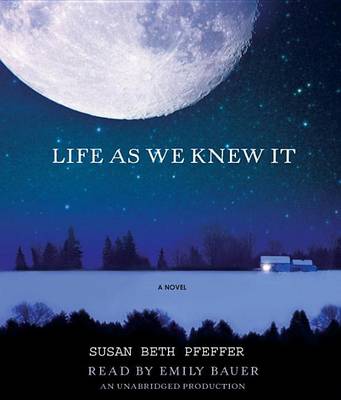
I guess I always felt even if the world came to an end, McDonald's still would be open.
High school sophomore Miranda's disbelief turns to fear in a split second when an asteroid knocks the moon closer to Earth, like "one marble hits another." The result is catastrophic. How can her family prepare for the future when worldwide tsunamis are wiping out the coasts, earthquakes are rocking the continents, and volcanic ash is blocking out the sun? As August turns dark and wintery in northeastern Pennsylvania, Miranda, her two brothers, and their mother retreat to the unexpected safe haven of their sunroom, where they subsist on stockpiled food and limited water in the warmth of a wood-burning stove.
Told in a year's worth of journal entries, this heart-pounding story chronicles Miranda's struggle to hold on to the most important resource of all--hope--in an increasingly desperate and unfamiliar world. An extraordinary series debut!
Susan Beth Pfeffer has written several companion novels to Life As We Knew It, including The Dead and the Gone, This World We Live In, and The Shade of the Moon.
- ISBN10 0739336835
- ISBN13 9780739336830
- Publish Date 12 September 2006
- Publish Status Out of Stock
- Publish Country US
- Imprint Listening Library
- Format Audiobook (CD)
- Pages 7
- Language English
Reviews


cornerfolds
I've been putting this series off for years and I honestly couldn't give you a good reason why. I think a couple years ago I might have been worried it would be too much like all the other dystopian fiction I was reading. Lately I've been dying for a good dystopian book to read and since we have a severe lack of them being published at the moment, I went to the backlist and finally picked this up!
Life As We Knew It is told from Miranda's point of view. In fact, it's told in her journal entries, which I have mixed feelings about, but more on that later. She's a normal teenager who just wants to think about boys and enjoy her after school hobbies, but then the moon is hit by a meteor and things slowly start to change. Miranda was fine as a character, but she really wasn't anything special. She had her mom and two brothers, dad and stepmom, and they all coped in their own ways with the changing world. Miranda had her bratty moments as any teen would, but she also had a couple moments of amazing character and I did enjoy her relationships, especially with her mom.
Really, there could have been a cardboard box in place of the main character because the main focus of this book was the events happening around them. I am an absolute sucker for post-apocalyptic survival stories and this one was fantastic! Personally, I thought that the upcoming book Dry was probably a bit more true to life, but this was definitely a great look into how one family survived. I was a bit skeptical about the fact that neighbors left each other alone and only empty houses were looted, but this is YA so I'll let it slide.
Events in this book happen a bit slowly, sort of how I'd imagine things would happen if the moon really was knocked a bit closer to Earth and really did change things the way it happened in Life As We Knew It. Electricity, water, and other utilities slowly start to permanently disappear. Since things don't happen overnight, people have time to slowly realize what kind of situation they're stuck in. I enjoyed watching Miranda and her family come together and figure out how to survive the winter. The effects of the slow deterioration of personal space was also fascinating.
Life As We Knew It was a fun dive back into the world of dystopia, but it wasn't perfect. I did feel that Miranda's journal entries weren't quite convincing enough. When a book goes for this kind of style, I prefer it to go all in. Instead, her writing went back and forth between feeling like a teenager's diary and feeling like any other book (so definitely not how a teenager or anyone else would describe things in a journal). I also wish things had felt a little more urgent in the beginning. Everyone was pretty chill when the natural disasters started happening because they weren't in their part of the country, assuming "the scientists" would figure it out. I'd like to think people wouldn't panic, but I definitely think there would be more preparation than is shown in this book.
Overall, this was just what I needed to get away from the oversaturation of fantasy books currently being published. I'll definitely be continuing the series and looking for more dystopia and survival books I missed in the past! Feel free to leave suggestions in the comments!

Amber (The Literary Phoenix)
In the beginning, Miranda was worried about skating lessons.
Life is normal. Her brother is coming home from college for the summer. Her step-mother is pregnant. She has three essays due on the same topic. Then a meteor hits the moon with enough force to move the celestial body and everything changes. Weather changes, communication goes out. Mayhem. The end of the world.
This story is Miranda's diary on the goings-on of life after everything changes.
I'm really glad I gave this book a chance.
I very nearly DNF'd this book a couple hours in. I didn't love the format, and Miranda annoyed me. The narrator wasn't my favorite. But I gave it a chance, telling myself "just wait for the apocalyptic part and then decide". When it happened, I was hooked.
The science of this book is really interesting and I think that's why I put it on my TBR in the first place, several years ago. Our celestial bodies are in such perfect alignment right now for the preservation of life - what would happen if something moved, just a little? That question is definitely explored here. This is the kind of science-fiction I enjoy. The subtle changes. Our world, but with one small difference. I think that Susan Beth Pfeffer did an excellent job exploring this question.
Miranda's evolution is subtle and perfect.
I really like that nobody's personality did a 180 after the event. It's such an issue for me in dystopias, especially apocalyptic ones, when meek people suddenly become Strong Incredible Characters. There's a difference between stepping up to the challenge and changing everything about who you are. All the characters in this book still had faults - the difference was that they adapted. Sometimes slowly! And they didn't always like it? I love realistic, imperfect characters like this. They are so much easier to relate to.
As I was listening to the audiobook, near the end, it occurred to me how much Miranda had changed from the beginning of the book and I hadn't even realized it. A good character evolution should sneak up on you like that. People change and grow that way - how often have you known someone to stand up and say "From now on, I am going to be less selfish!" and then magically it happens? No... changes in people are really subtle and Pfeffer did an AMAZING job of portraying this. Even though I hated Miranda in the beginning, I cared about her well-being by the end. She grows on you.
If you like subtle science fiction, this book is for you.
Life As We Knew It isn't in-your-face science and tech. It's simple. Basic. One small element of difference then a chain reaction of events. I really liked it for this element - it reminded me a bit of the ideas of H.G. Wells and Jules Verne. I'll be reading the sequel to this book, and I recommend this to anyone who is interested in apocalyptic stories or journal-format YA.

nitzan_schwarz
I honestly loved this so much. Most dystopias start with the world already ravaged and ruined, but not this one. This one gives you a glimpse of normal life and then crushes it all to bits and pieces as it describes the drastic and dramatic decline and one family's struggle to survive it through the eyes of Miranda.
This book is slow, but in no point did I get bored. I was riveted, and so connected to the characters and their stories that I teared up, especially in the good times, because I could literally feel how precious they were to these people.
This book does make one want to stock on food and batteries and savor every pint of ice cream and chocolate. The scariest part is that as I was reading on earthquakes in the book, there were all the earthquakes in Europe and I swear this book made me so paranoid for a moment I thought I might be living in it and the end of the world (as we know it) is coming.

Kelly
http://divainpyjamas.blogspot.com.au/2013/07/life-as-we-know-it-by-susan-beth-pfeffer.html
The concept is terrifying. A natural and reoccurring phenomenon such as an asteroid hitting the moon is enough to bring the world to it's knees. The story of death, courage and survival is told from the pages of Miranda's journal, from the few days prior, to the asteroid knocking the moon off orbit, to the horrifying and deadly hell that unleashed over our dying planet. You'll feel every high and low that'll make you appreciate what you have now.
And don't be surprised if next shopping trip, you include a few more non perishable cans to stockpile.
It's simplistic, frightening and unbelievably good.

nannah
When I take a step back from it all, and really look at it, this book doesn't really have a plot. And besides maybe one or two plot points, there really aren't any pivotal events or action. Everything seemed to bounce back and forth: I love Mom, I hate Mom; today was horrible, today was wonderful; things are always getting worse. I think that sums the book up in a nutshell. I think half of it was spent telling the audience what they already knew (again, Matt was chopping wood, he was chopping wood again today, today Matt was out chopping wood, Matt spent all day chopping wood, etc.) in each new entry.
I am surprised, though, that I wasn't annoyed with the diary entry style. I hear about people having complaints about her voice and language, that she sounds much too old for her age. I thought so too until I checked some journals I kept when I was about 15-16 and I wrote more or less like our main protag here, so I guess maybe that's something I shouldn't complain about! I was, however, hoping for some sort of change in voice as the book went on, some sort of maturity or breaking down of voice, just something, since everything kept steadily getting worse and worse. I think that would have helped character development, too, as most characters were pretty two-dimensional; most character development was presented in dialogue from character to character or told in backstory ("she used to be this other person") that wasn't shown.
Near the end, I just wanted SOMETHING good to happen. This book was so horribly depressing and it was almost tough to sit down and try and read more. I didn't want any of the characters to die, not because I necessarily cared for them, but because there was no way this book could get more (almost pointlessly) depressing just to prove that things get bad in a near-apocalyptic setting.
Since I'm already talking about the end . . .
SPOILERS BELOW:
I was happy that Miranda's family finally got some help, but I didn't like the way Pfeffer went about it: the government saves all. Despite how Miranda's mom kept hounding on the president at his every mention, in the end, he saves everyone, apparently. And when Miranda shows up at the city hall where those government men are going to give her food, they were so . . . cheerful, it seemed to me. It's been made out that by this point Miranda is *literally* a walking corpse and that she was going to die even before she made it back home (not to mention her brother knew it too), and they didn't even seemed touched by it. I mean, I'm sure they saw a lot of it, but it just struck me as odd. The ending just kind of hung off. It felt like any other chapter ending in the rest of the book.
I will probably read the sequels, just to know how this story actually ends, but I'll give it a little time so I can get my mind out of all this depression.

clementine
The characters were poorly developed and I didn't care about any of them. Miranda comes off as whiny and pathetic, always relying on someone else to do things for her. None of the other characters seemed to have any discernible personality. Miranda's narration also bothered me. It was unnatural and simplistic all at once - no 16-year-old girl talks like that, and it certainly seemed like Pfeffer was talking down to people given that Miranda is amazed that she knows the word "despicable".
I don't know, once again I feel disappointed by a dystopian/post-apoc novel with a great premise that just fell flat.

boghunden
Det kan nok være, det her er en bog for børn og unge (tillader mig at høre under den kategori lidt endnu ;) ), men jeg vil nu mene voksne mennesker også vil kunne få lidt ud af den. Man kan let sætte sig ind i, hvordan Mirandas mor prioriterer sine børn højere end sig selv, hvordan hun gemmer følelserne væk og lader overlevelsesinstinkterne sætte ind.
Det eneste der faktisk irriterede mig lidt, det var at halvvejs inde i bogen, begyndte forfatteren at kalde lillebroren for Jon i stedet for Johnny. Det kunne godt forvirre lidt, når man nu var så langt inde i bogen.
Jeg har allerede reserveret toeren på biblioteket.
